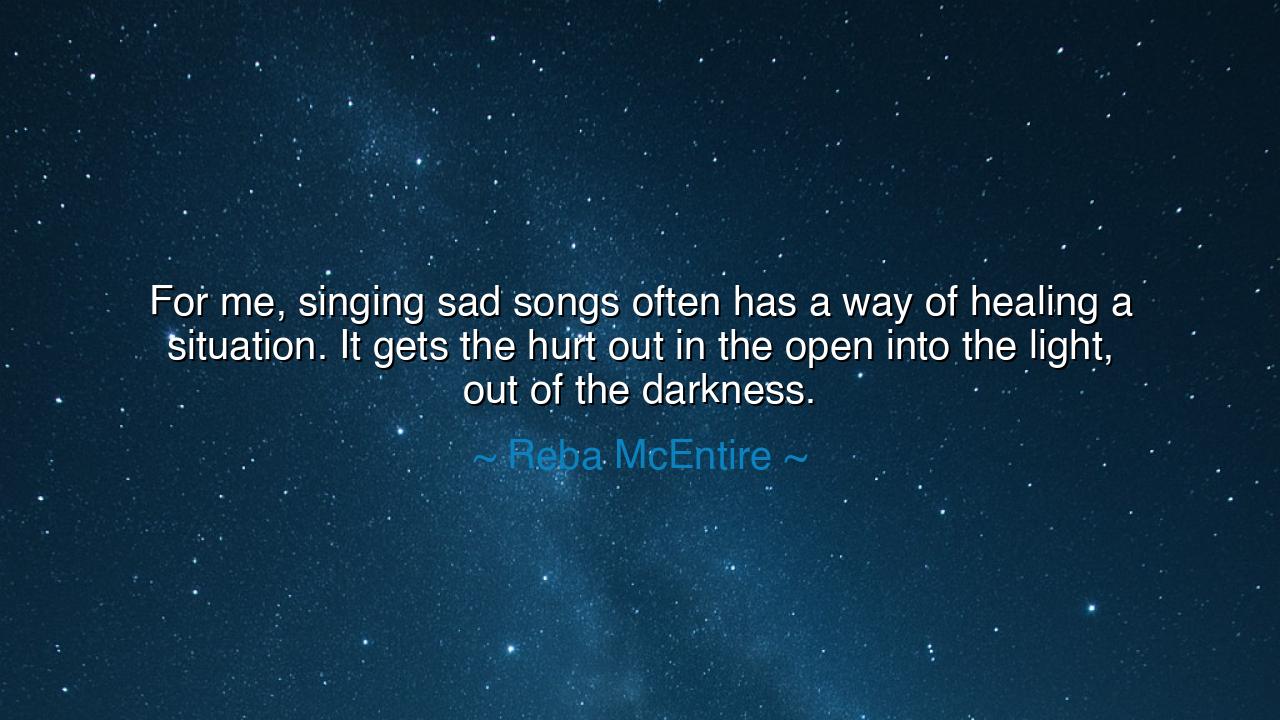
For me, singing sad songs often has a way of healing a situation.
For me, singing sad songs often has a way of healing a situation. It gets the hurt out in the open into the light, out of the darkness.






In the gentle yet powerful words of Reba McEntire, the queen of country soul, we find a truth as timeless as song itself: “For me, singing sad songs often has a way of healing a situation. It gets the hurt out in the open into the light, out of the darkness.” These words are not merely the reflection of an artist—they are the confession of a healer, one who understands that grief unspoken becomes poison, and that through the sacred act of music, pain can be transformed into peace. For what Reba speaks of here is not entertainment, but catharsis—the ancient human art of releasing sorrow by giving it voice.
The origin of this quote lies in McEntire’s long and storied life as a singer, performer, and woman who has known both triumph and tragedy. Her career in country music, a genre steeped in the language of heartbreak, loss, and redemption, has been marked by songs that touch the wounded places of the heart. Yet, unlike despair that festers in silence, her sadness becomes song—pain transmuted into melody, darkness reshaped into light. When she says that singing “gets the hurt out in the open,” she is describing the sacred act of confession through art. Just as ancient priests once purified souls through ritual, the artist purifies the spirit through expression.
This truth echoes back to the wisdom of the ancients. The Greeks called it katharsis, the purging of emotion through art and drama. In the tragedies of Sophocles and Euripides, audiences would weep not for themselves alone, but for the shared pain of humanity. To cry, to feel, to witness sorrow brought into the open—this was no weakness; it was cleansing. Reba, in her own way, carries that ancient torch. When she sings a sad song, she becomes both the storyteller and the listener, both priestess and pilgrim. She teaches us that sorrow is not meant to be buried—it must be sung into the open, where it can dissolve in the warmth of understanding.
Consider, too, the story of Billie Holiday, whose haunting voice once carried the weight of her own suffering and the suffering of her people. When she sang “Strange Fruit”, the song was not just music—it was a cry against injustice, a lamentation that demanded the world’s attention. In bringing pain into the light, Holiday revealed the power of sorrow to awaken conscience and to heal truth through confrontation. Reba’s quote speaks to this same principle: that the heart’s deepest wounds, when hidden, become chains—but when revealed, they become bridges to healing.
When Reba says that she brings pain “out of the darkness,” she reminds us that darkness is not evil—it is simply unspoken. Every human being carries within them hidden aches: the griefs unshared, the fears unacknowledged, the regrets whispered only to the stars. But the act of expressing those emotions—through song, through writing, through honest conversation—becomes the act of bringing light into shadow. Light does not destroy the darkness; it transforms it. The sadness that once haunted becomes wisdom, the tears that once burned become clarity. This is the miracle of expression: to take what is unbearable and make it beautiful.
In a world that often glorifies happiness and hides pain, Reba’s wisdom becomes an act of rebellion. She teaches that to feel deeply, even to sing of sorrow, is to be fully alive. We are not meant to numb our grief or silence our hearts. The balance of the world depends upon both joy and lament, laughter and weeping. Just as the rain must fall before the fields can bloom, so too must tears fall before the soul can heal. To deny sadness is to deny one’s humanity; to express it is to reclaim it.
Thus, the lesson of Reba McEntire’s words is simple, yet eternal: bring your pain into the light. Do not fear your tears; they are not signs of weakness but of release. Speak, sing, write, create—let your heart breathe its truth. When sorrow is shared, it ceases to be a prison and becomes a path. Find your voice, whatever it may be, and let it carry your burdens upward. In doing so, you will discover, as Reba did, that healing is not found in silence but in song—that the same voice that trembles with grief can one day rise again in joy.
So remember this, dear listener: every heart must sing its sorrow to be free. The darkness within you is not a curse; it is the soil from which new strength will grow. Bring it forth, as Reba McEntire has done, into the open air of truth and melody. For when pain meets expression, it no longer rules the soul—it becomes its teacher. And from that meeting of sadness and light, from that brave act of honesty, comes the greatest gift of all: peace.






AAdministratorAdministrator
Welcome, honored guests. Please leave a comment, we will respond soon